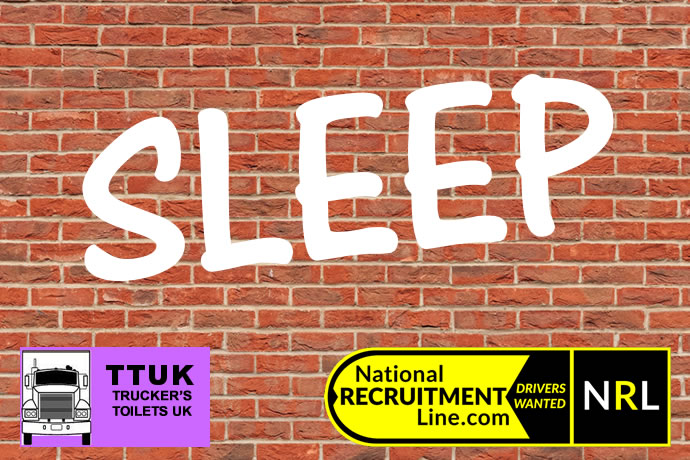
“It comes back to the lack of overnight facilities - decent ones. I saw a lorry parked on a major main road last night, opposite a main junction. With traffic noise and headlights shining in the cab I bet the driver didn't get a quality night’s sleep”. [lorry driver 300518]
Why sleep is important for lorry drivers:
After a busy day on the road, sleep acts like a rechargeable battery. It helps the body recover in readiness for the next day and contributes towards driver safety and the safety of other road users. It also boosts the immune system and helps with healing. Good sleep contributes towards driver safety and the safety of other road users. 1
We spend around a third of our life asleep. Sleep is vital to our health. We need to eat, drink, breathe – and sleep in order to maintain good mental and physical health. The lack of recognition of the importance of sleep within the haulage industry is putting lives at risk. 2
The workplace
For lorry drivers the cab is their workplace. They generally operate on their own with perhaps just the radio for company. Whilst out on the road concentration is vital. Drivers must remain focused not only to safeguard their own welfare but also the safety of other road users. The size of their vehicle, its load, the road conditions, the route to their destination and the behaviour of other road users must all be taken into account. At the same time drivers must adhere to the laws and regulations associated with their work. The need for such serious concentration means that proper sleep is an important factor in ensuring a driver can react appropriately to any circumstances they encounter 3
The current situation
There are, quite rightly, regulations in place which demand drivers take rest breaks and sufficient sleep hours in order for them to maintain the alertness required when driving. However the dire shortage of safe places to park where toilets, showers and good food are available means that drivers have to either break the law and continue driving until they find a suitable stopping place, or park in a layby or other areas which do not provide safe or quality places to rest. To add to the drivers’ dilemma, stopping in unregulated places leaves them vulnerable to being moved on and possibly incurring a fine regardless of their tiredness level. This adds an additional difficulty to an already stressful situation.
The location of some lorry parks, regulated and unregulated, means that drivers may fail to get a satisfactory level of sleep. This may be related to the possibility of being moved on, the allocation of a space alongside a busy road, positioning next to a noisy vehicle and concerns over personal safety and safety of the load being carried.
A tired driver is a dangerous driver.
A tired driver will find it difficult to concentrate properly on driving and be unable to make a fast decision. Studies have shown that driving whilst tired has the effect on the body similar to that of drinking alcohol. This means that an accident is more likely to occur that could involve other road users. 4
What does tiredness ‘look like’?
- Trouble focusing
- Heavy eyelids
- Inability to remember the last stretch of road
- Constant yawning
- Head nodding
- Drifting from lane to lane
The health of lorry drivers at work
The need to increase suitable locations for rest breaks is frequently discussed amongst politicians and the haulage industry but unfortunately not enough positive action has taken place for many years. Drivers therefore continue to drive on the UK road network with few opportunities to take decent rest and sleep breaks. They are constantly under threat of receiving a warning or fine if parked incorrectly or for longer than allowed. When fatal accidents occur that involve drivers or passengers of HGVs they are not recorded as workplace deaths as the Health & Safety Executive is not involved. Therefore there is a lack of data relating to ‘the underlying and longer-term factors which could have contributed to the fatal accidents’ 5
Possible solutions:
Discussions with the Department for Transport [DfT] Working Group in November 2017 included the following:
Immediate
- The provision of ‘pop up’ truck stops
- Overnight use of business parks and industrial areas
Longterm
- Opportunities to make use of the Park and Ride areas
- More active use of the Section 106 obligations
- Improved provision of truckstops and lorry parks
...the biggest hurdle is getting planning permission granted by District Councils. [Working Group November 2017]
Conclusion:
Ignoring the importance of sleep endangers the safety of lorry drivers and other road users. Sleep is a vital factor in keeping our lorry drivers and other road users safe
The health and wellbeing of lorry drivers deserves priority status.
We'd like to thank Gillian Kemp from Truckers Toilets UK for sharing this blog. To learn more about the TTUK campaign please visit TTUK Campaign on facebook
- 1 https://www.resmed.com/us/en/consumer/diagnosis-and-treatment/healthy-sleep/what-happens-during-sleep.html
- 2 www.mentalhealth.org.uk/blog/importance-sleep
- 3 http://www.apa.org/topics/sleep/why.aspx
- 4 https://sleepfoundation.org/sleep-topics/drowsy-driving-vs-drunk-driving-how-similar-are-they.
- 5 http://www.unitetheunion.org/news/lorry-drivers-lives-being-placed-in-danger-due-to-long-hours-and-lack-of-facilities-unite-warns/
01 June 2018